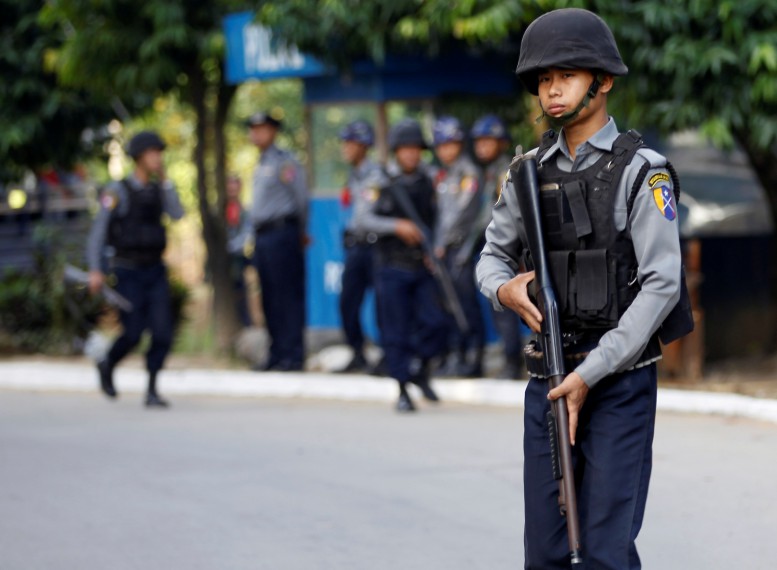Human rights advocates both at home and abroad this week issued calls for the creation of an independent, international commission of inquiry into allegations of serious human rights abuses committed by Burmese security forces in northern Arakan State.
More than 40 civil society groups in Burma released a statement on Wednesday calling for the international intervention.
“We believe that a truly independent investigation would help Myanmar overcome the complicated problems in Rakhine [Arakan] State, and help re-balance the world’s focus on the overall human rights challenges faced by all the people of Myanmar,” read the joint statement.
It added that an independent probe could help sort fact from fiction in light of “several competing narratives attempting to explain the complicated situation of human rights and communal tensions in Rakhine State.”
Clarifying the situation in Arakan State could help improve human rights nationwide, the statement concluded. It was released by a cross-section of Burmese civil society including advocates of development, democracy and the rights of women, youth and minorities.
The 41 signatories echoed the London-based Burma Campaign UK, which on Tuesday also urged the Organisation of Islamic Cooperation to back a UN Commission of Inquiry. The OIC, a grouping of 57 Muslim countries, is due to meet on Thursday to discuss the violence of recent months, which Rohingya Muslims have borne the brunt of as security forces have conducted “clearance operations” in search of suspected Muslim militants. The ongoing manhunt was launched on 9 October, when armed attackers overran three border police posts in Maungdaw and Rathedaung townships, killing nine police officers.
“The OIC should be applauded for holding this emergency meeting on the Rohingya crisis, but they must follow through with practical action,” said Mark Farmaner, director of Burma Campaign UK. “A UN Commission of Inquiry is an essential step toward establishing the facts, reducing human rights violations, and identifying long-term solutions. We cannot carry on the cycle of crisis after crisis and an ever worsening situation for the Rohingya.”
Allegations of extrajudicial killings, rape and the razing of Rohingya villages have all been levelled against security forces in northern Arakan State, and the government has pushed back forcefully against the claims.
Facing growing international scrutiny, the National League for Democracy-led administration appointed an investigative commission to probe the initial attacks, subsequent security crackdown and human rights allegations. Its interim report, released on 3 January, did little to assuage the concerns of human rights advocates and was described by Human Rights Watch’s deputy director for Asia as a “whitewash.”
Matthew Smith, executive director of Fortify Rights, in a statement from the group said the Union-level investigative commission and other efforts to address the deteriorating situation in Arakan State had failed to fulfill their mandates, necessitating an international role.
“In three months we’ve seen the formation of an advisory commission, a whitewash commission, and a discriminatory commission,” said Smith, referring also to a commission appointed by the Arakan State legislature in the wake of the October 9 attacks, and an advisory body formed in August and chaired by former UN secretary general Kofi Annan. “None of these bodies are conducting a serious, impartial investigation into ongoing human rights violations. The international community needs to wake up to the fact that domestic remedies have been exhausted and the situation of the Rohingya is worsening by the day.”
He told DVB the statement from the 41 Burma-based civil society groups indicated greater openness to international involvement in Arakan State’s woes than believed by many.
“For months, we’ve heard from certain diplomats and others that the people of Myanmar would never accept an independent international commission of inquiry into Rakhine State. This statement suggests otherwise,” he said.
[related]
For its part, the government has largely insisted that the troubles in the state are an “internal affair,” though on 19 December State Counsellor Aung San Suu Kyi did go some way toward acknowledging the transnational nature of the Rohingya’s plight when she convened a meeting of ASEAN foreign ministers in Rangoon to discuss the situation.
Calls for international intervention this week were preceded by an open letter signed on 29 December by more than 20 Nobel Peace Prize laureates, who urged the UN Security Council to end “ethnic cleansing and crimes against humanity” in Arakan State.
OIC countries make up about one-quarter of the United Nations Human Rights Council’s 47 members. The council is due to meet in March, when a proposal for a Commission of Inquiry could be put forward.
Previous commissions of inquiry have probed human rights abuses in Libya, Syria, North Korea, Sri Lanka and elsewhere.



